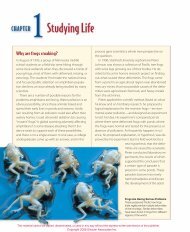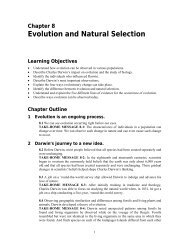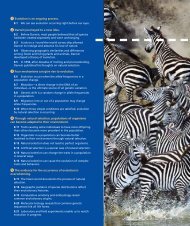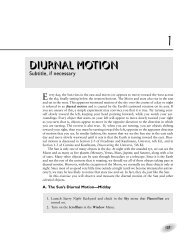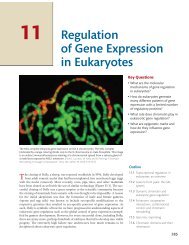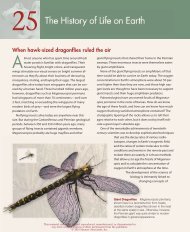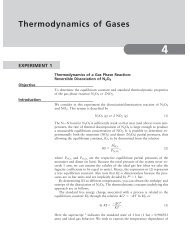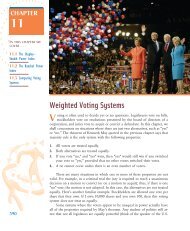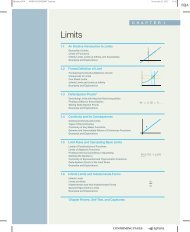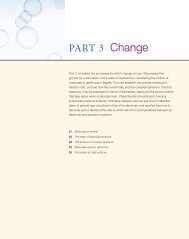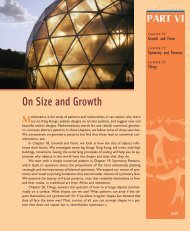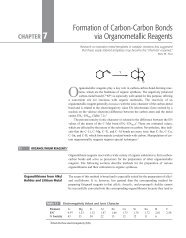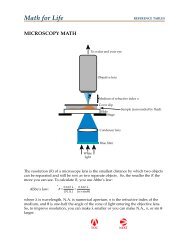Chapter 3 Population Geography - W.H. Freeman
Chapter 3 Population Geography - W.H. Freeman
Chapter 3 Population Geography - W.H. Freeman
Create successful ePaper yourself
Turn your PDF publications into a flip-book with our unique Google optimized e-Paper software.
100 <strong>Chapter</strong> 3 <strong>Population</strong> <strong>Geography</strong><br />
2000<br />
6 billion<br />
6 billion<br />
1987<br />
5 billion<br />
5 billion<br />
<strong>Population</strong><br />
Resources<br />
1975<br />
4 billion<br />
1960<br />
3 billion<br />
1930<br />
2 billion<br />
4 billion<br />
3 billion<br />
2 billion<br />
Quantity<br />
10,000 B.C.<br />
5 million<br />
Year 1A.D.<br />
250 million<br />
1800<br />
1 billion<br />
0<br />
10,000 B.C. 5000 B.C. Year 1A.D. 1000 2000<br />
1 billion<br />
Time<br />
t l<br />
Figure 3.22 World population doubling timeline. This graph illustrates<br />
the ever-faster doubling times of the world’s population. Whereas<br />
accumulating the first billion people took all of human history until about<br />
a.d. 1800, the next billion took slightly more than a century to add, the<br />
third billion took only 30 years, and the fourth took only 15 years. (Adapted<br />
from Sustainablescale.org.)<br />
Figure 3.23 Malthus’s dismal equation. Thomas Malthus based his<br />
theory of population growth on the simple notion that resources (food)<br />
grow in a linear fashion, whereas population grows geometrically.<br />
Beyond time t l<br />
, population outstrips resources, resulting in famine,<br />
conflict, and disease.<br />
of every 10 humans who ever lived on Earth is alive today. If<br />
we were to consider only those humans who survived into<br />
adulthood, the proportion alive today would come closer to<br />
one in five!<br />
Some scholars foresaw long ago that an ever-increasing<br />
global population would eventually present difficulties.<br />
The most famous pioneer observer of population growth,<br />
the English economist and cleric Thomas Malthus, published<br />
An Essay on the Principle of <strong>Population</strong>—known as the<br />
“dismal essay”—in 1798. He believed that the human ability<br />
to multiply far exceeded our ability to increase food<br />
production. Consequently, Malthus maintained that “a<br />
strong and constantly operating check on population”<br />
would necessarily act as a natural control on numbers. Malthus<br />
regarded famine, disease, and war as the inevitable<br />
outcome of the human population’s outstripping the food<br />
supply (Figure 3.23). He wrote, “<strong>Population</strong>, when unchecked,<br />
increases in a geometrical ratio. Subsistence only<br />
increases in an arithmetical ratio. A slight acquaintance<br />
with numbers will show the immensity of the first power in<br />
comparison of the second.”<br />
The adjective Malthusian entered<br />
Malthusian<br />
Those who hold the views of the English language to describe the<br />
Thomas Malthus, who believed dismal future Malthus foresaw. Being<br />
that overpopulation is the root a cleric as well as an economist, however,<br />
Malthus believed that if humans<br />
cause of poverty, illness, and<br />
warfare.<br />
could voluntarily restrain the “passion<br />
between the sexes,” they might avoid their otherwise<br />
miserable fate.<br />
Or Creativity in the Face of Scarcity?<br />
But was Malthus right? From the very first, his ideas were<br />
controversial. The founders of communism, Karl Marx<br />
and Friedrich Engels, blamed poverty and starvation on<br />
the evils of capitalist society. Taking this latter view might<br />
lead one to believe that the miseries of starvation, warfare,<br />
and disease are more the result of maldistribution of the<br />
world’s wealth than of overpopulation. Indeed, severe<br />
food shortages in the late 2000s in several regions point to<br />
precisely this issue of inequitable food distribution and its<br />
catastrophic consequences.<br />
Malthus did not consider that when faced with conundrums<br />
such as scarce food supplies, human beings are highly<br />
creative. This has led critics of Malthus and his modern-day<br />
followers to point out that although the global population<br />
has doubled three times since Malthus wrote his essay, food<br />
supplies have doubled five times. Scientific innovations such<br />
as the green revolution have led to food increases that have<br />
far outpaced population growth (see <strong>Chapter</strong> 8). Other measures<br />
of well-being, including life expectancy, air quality, and<br />
average education levels, have all improved, too. Some of<br />
Malthus’s critics, known as cornucopians,<br />
argue that human beings<br />
are, in fact, our greatest resource<br />
and that attempts to curb our<br />
numbers misguidedly cheat us<br />
out of geniuses who could devise<br />
creative solutions to our resource<br />
cornucopians<br />
Those who believe that science<br />
and technology can solve resource<br />
shortages. In this view,<br />
human beings are our greatest<br />
resource rather than a burden to<br />
be limited.



